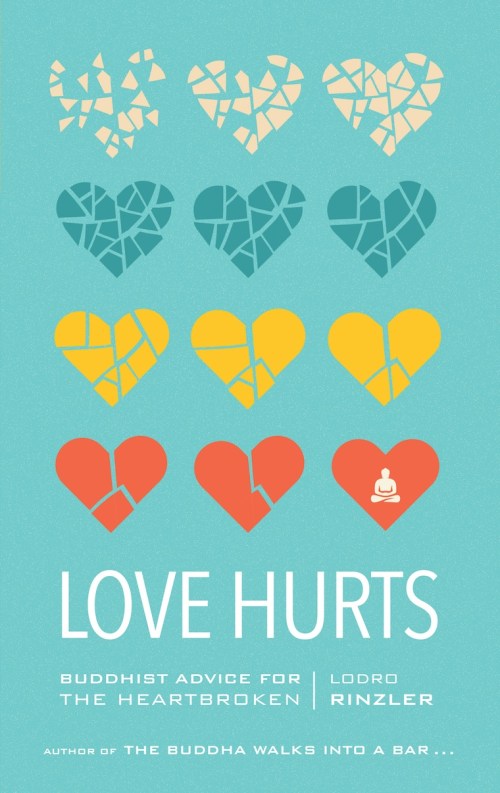How to handle heartbreak, Buddhist style
Lodro Rinzler, co-founder of New York City meditation studio MNDFL, shares an excerpt from his new book, "Love Hurts"—a high-vibe look at our lowest moments.

What’s the high-vibe way to deal with your lowest moments? Lodro Rinzler, the co-founder of MNDFL meditation studio in New York City, tackles that topic in his latest book, Love Hurts: Buddhist Advice for the Heartbroken, to be released December 13. Here, he shares a chapter titled “Not Giving Up on Anybody.” (And yes, he means it.)

“I’ll be damned, Lodro,” you may be thinking, having read the title of this section, “if I’m not gonna give up my ex. He is a cheating, lying dirtbag and I am for sure going to give him up…the moment I can stop thinking about him every five minutes.”
Let me be very clear: there are times when we might need to cut someone out of our life. That person may be:• a romantic partner who has hurt us• a family member who is abusive• a friend who is insultingly self-absorbed• a coworker who tries to turn every conversation into a way to sabotage us• a leadership figure who has gravely disappointed or shocked us
I get that you might need to end regular relations with that person. I am drawing a line between cutting off contact with someone and inwardly giving up on them. Heartbreak can mean loving someone and wishing they would go fuck themselves at the same time. It’s a confusing emotion because of just that sort of contradiction.
Just because we have been hurt by someone doesn’t mean that they no longer deserve happiness in their lives or are beyond anyone’s help. I’m a firm believer that everyone possesses basic goodness.
The Buddha was a living example of someone who was totally spoiled growing up, then tortured himself in the name of spirituality, only to see that he didn’t need to explore external factors in search of peace—he had it within him all along. That is why we call the Buddha the tathagatha, or “awakened one.” He woke up to his inherent peace and goodness. He’s a role model in that we, too, can wake up to our basic goodness.

Let me pause for a second to drive this point home, because it’s important: you are basically good. You are basically whole, complete, worthy, kind, and sane. That is who you are, according to the Buddhist perceptive and my own experience of everyone I have met, so I am pretty damn sure it’s the same for you, too. Yes, you may act confused at times, but that does not negate your goodness.
When I was traveling on one of my book tours I spent some time in North Carolina. I was hosted by a really wonderful couple. I had never met them before. They showed me where I would be staying and drove me to my event. We made small talk on the way and they were polite but reserved.
That night I was asked a question I get asked quite frequently when I travel and speak on my work: “How can everyone possess the same goodness the Buddha possessed? Surely Hitler wasn’t inherently good? Surely Charles Manson isn’t basically good? There are people out there who do a lot of evil things!” I answered in the way I often answer: there are many people out there who are very, very confused. That does not mean that underneath their various layers of confusion, neurosis, and pain that they aren’t basically good. They are. That means that we need to rouse ourselves to hold compassion and try to create the space for them to realize that they can do good because they are basically good. We shouldn’t give up on anybody.
Sometimes we may go through a breakup and think our ex is crazy and deranged. Even if that is true, they are not basically evil.
Sometimes we may go through a breakup and think our ex is crazy and deranged. Even if that is true, they are not basically evil. They still possess basic goodness, but they are not connected to it or know how to act from it. They are connected to their insecurity and pain. How sad is that? It would be wonderful if we could see that and rouse compassion for them, no matter how hard that might be to do.
On the way home from that talk my host was very quiet. Eventually she piped up and told me a story. When she married her husband they both had children from previous marriages. One of their children was a delightful young man who got involved in the wrong crowd. If I recall correctly, drugs were frequently involved and at one point this group of teenagers got high, beat up, and ultimately murdered a young child. This woman, who is a sweet and kind person, could not believe that she had raised a murderer.

Her stepson had been sentenced to jail and for a period of time she could not bring herself to see him. When she did go see him he was very closed off. She persevered and continued to show up for him in an openhearted way. One day he asked her about the family dog, whom he loved. They were able to share in a tender way their love for the dog. Another time not too long afterward he asked about art supplies, and not too long after that he was back to painting, something he had not done in years.
Now, she said, he has softened. She can once more see that young man she had raised, and he is deeply remorseful for what he has done. “I had given up on basic goodness” she said. “I didn’t believe he was basically good.” But, out of loyalty, she didn’t give up on him. She persevered and showed up for him, offering love, over and over again. Eventually he let the armor around his heart fall away a bit in response and was once more able to become more of who he was. Her faith in the fact that we are all basically good then flourished. What can we learn from this woman? My takeaway is that we should not write anyone off. Even if someone hurts us or commits an atrocity they can still turn things around.
In my tradition, that of Shambhala, we have a saying: “Never give up on anybody.” I know I have people in my life I can’t regularly engage with because they are aggressive, slanderous, and my presence does not do anything to change that. It may take a more enlightened being than I, or perhaps they may need to go through their own heartbreak in order to soften. That doesn’t mean I’ve given up on them. It just means I don’t call them every Sunday.
If you are experiencing heartbreak because of another person, don’t give up on them; don’t cut them off in your heart, even if you have to cut off regular contact with them.
In the Buddhist tradition we refer to beings willing to keep their heart open no matter what as bodhisattvas. Bodhi is a Sanskrit word that can be translated as “open” or “awake.” Sattva can be translated from Sanskrit as “being” or “warrior.” It’s a person who is incredibly brave in maintaining an open heart, no matter what comes up in their life. This experience is something we can aspire to. The Zen master Seung Sahn once said, “Being a bodhisattva means when people come, don’t cut them off; when people go, don’t cut them off.”
The following example is a little less Zen: but one of the people I met with during my heartbreak research really hit the nail on the head in regard to this particular topic. She was talking about her ex-boyfriend and how she was maintaining a steady balance between disliking him and not giving up on him entirely when she met my gaze and stated, “I feel respect for him…even though he’s a piece of shit.”
If you are experiencing heartbreak because of another person, don’t give up on them; don’t cut them off in your heart, even if you have to cut off regular contact with them. I want to encourage you to hold some hope that they may change. The damage done to your relationship may be irreconcilable but that doesn’t mean they are fated to die alone and hated by all. They can still connect to the goodness inside of them and change for the better.
Pema Chödrön is a Shambhala Buddhist teacher who has written extensively about the pain of a broken heart and I can’t recommend her work more highly. Below I have adapted an exercise she has recommended. It starts by taking a photo of the person you are having a hard time with and displaying it prominently in your home. This may initially cause you discomfort. So much of working through heartbreak is staying with our discomfort, so that’s not necessary a bad thing.
Every time you walk by the photo look at the being you are struggling with and simply say, “I wish you the best.” If that rings hollow to you instead say, “I know you are basically good” or “You’re not a jerk all the time.” Whatever phrase you choose, make it personal but also make it a way of acknowledging that they are not basically evil. Do this several times a day, whenever your gaze falls on the photo. Let your heart soften toward them over time.
From Love Hurts, © 2016 by Lodro Rinzler. Reprinted by arrangement with Shambhala Publications, Inc. Boulder, CO. www.shambhala.com
Another way to find some peace when your heart is heavy? Hitting the pavement. Here’s some advice from the author of Running: A Love Story and seven surprising ways to become a better runner.
Sign Up for Our Daily Newsletter
Get all the latest in wellness, trends, food, fitness, beauty, and more delivered right to your inbox.
Got it, you've been added to our email list.










